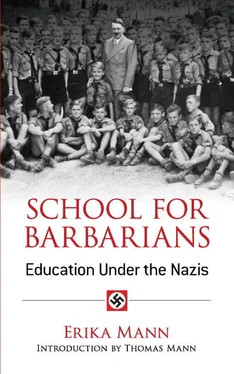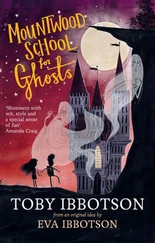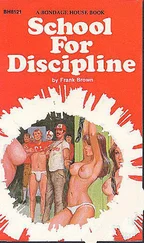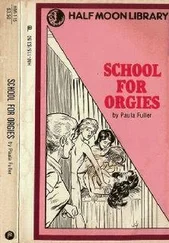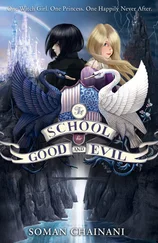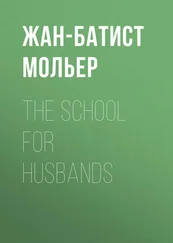Du kleiner Tambour, schlage ein!
Nach Moskau wollen wir marschieren!
Nach Moskau wollen wir hinein!
Der Bolschewik soil unsre Kräfte spüren.
Am Wege wilde Rosen blühn,
Wenn Hitlerleut’ nach Russland ziehn!
Little drummer, beat your drum!
Off to Moscow will we march,
Into Moscow will we come!
The Bolsheviks will feel our force
And on the road wild roses bloom
When Hitler’s men to Russia come.
Or
Entrollt die Fahnen blutgetränkt,
Ein Feigling, wer an sich noch denkt…
Und naht dereinst der Rachetag,
Dann führen wir aus Not und Schmach
Das Hakenkreuz von Sieg zu Sieg.
Dann ziehen wir beim Morgenrot, ja rot,
Fur Hitlers Fahne in den Tod.
Unfurl the banners steeped in blood,
Cowards think of their own good…
And when the day of vengeance comes
We’ll lead the swastika from need
To victory on victory.
Follow, in morning’s red, red, red,
The flag of Hitler, till we’re dead.
The wild roses and the morning’s red are old images in Germany’s war songs. But not in its children’s songs. And then there was the flag of the Fatherland, in all the songs; not Hitler’s flag, for whose glory the march on Russia will be made.
These song-books are, row on row, identical; even their covers are alike, with, their Hitler-boys, their flags, drums, swastikas. The songs for girls are similar, as similar as this:
Feinde ringsum, greife zur Wehr, greife zur Wehr ,
Steh fest im Westen und Osten
Lass Deinen Ernst sie kosten,
Viel Feind, viel Ehr’!
Braun Heer voran! Heil Hitler Dir!
Treu willst den Frieden Du halten
Gegen der Feinde Gewalten
Folgen wir Dir!
Foes all around us, get your gun, get your gun,
Stand fast in the west and east,
Let them feel your zeal increased,
Many foes, much glory!
Brown Army, march! Hitler, to Thee!
You will keep peace faithfully
Against the hated enemy
We follow thee!
They are all like that: songs, recitations, almanacs, and “children’s games.” If you ask how evenings are spent at home, any little boy will tell you what good times he has (with his face drawn down dutifully), how he has just been in a play called, say, The Freemason Circus; he won’t know what a Freemason is, but he’ll tell about the unpleasant magician, and the fearful Jew, Amschel Rothschild, the circus director. There is a “black brother” too; very wicked, very funny, dressed in clerical clothes; a “red bear” with a Russian accent and a meek fool with “English’* traits. “I played a good part myself,” the little boy says, “in costume. I was made up as Marianne — they sprinkled perfume all over me. I was supposed to be France, you know: it was a political play.”
Oh, a political play! Well, what happens?
“You know perfectly well what happens!” he says in a mocking voice, laughing uncertainly and not believing that the question was honest. He speaks his punch line, timing it slowly, like a good actor reaching his climax: “The German, Michel, licks them all.”
Of course he does….
“Want to see how it goes?” he is asking. “We rehearsed for ages before we gave the real performance at the Gau meeting. I know every part by heart, backward and forward.”
All right, then, what does Marianne say to the red bear?
He takes his place as Marianne, giving her the loose loping walk and rotating hips of a street-walker, and doing it well, too. For the bear, he keeps his paw up in threat. “O, you lovely creature,” he says, deep in his throat, “O, sweet red bear!” he chirps in answer, falsetto, swinging his hips; and then, with his fist up too (a duet, he explains), “Let’s have a marriage pact.”
“Against Michel, a strong contract,” Marianne puts in calculatingly; but the bear knows what he’s after, and goes on roughly and covetously: “You’re my object, my delight, I’ll eat you up, love, in one bite!”
But that’s charming, and the little boy is so obliging, and such a good actor! And what does Michel say to this?
He frowns, pulls himself up tall, and begins to speak in a hoarse, monotonous, and familiar voice, barking: “On Lake Geneva stands a house, and many men go in and out, and talk and talk and talk!”
“Ow!” he interrupts himself. “Ow! Disarmament’s got me in the stomach. I’ll have to leave the room. Clean up your own mess!” He makes a face, shakes his head in disgust and rage, sticks his tongue out, and spits. The play’s over; he steps back, out of character. He has acted gracefully and rather well, but without the slightest emotion or real concern. “That’s what they’re like,” he says, offhandedly, “all of them.”
He knows other plays, too, and where to find them. That one was published in Spiele der Deutschen Jugend, which the Department of Culture of the Reich Youth Führung publishes, and there is a pamphlet called Camp Circus, which has games and charades — questions and answers. “Do you know this one?” he asks. “What’s this?” He opens his mouth as far as possible, holding his head with its soft blond shock of hair far back. “Give up? That’s French lockjaw, that they got when they noticed that the Rhineland was occupied again.”
Not bad at all! Any more?
He pulls out one of the fair hairs, and dangles it before you. “See that? That’s the hair the League of Nations hangs by!” Then, in the game, another boy comes up and says, “Thinking about the League will give you a toothache. We’ll fix that; we’ll pull it out.”
The tooth? you ask.
“I don’t know — the tooth or the League,” he says indifferently. “It’s all the same to me….”
It’s the only opinion he has given, and he has gone through the routines with complete lack of emotion. He does not care about the games. They are what he is compelled to play, and have become a habit to which indifference is the best reaction.
But he has to go now. He has an examination tomorrow.
Of course, go home now, you tell him, and get to work at your books….
“Books!” he repeats, in his young, hard-boiled way, surprise in his face. “I don’t have to crack a book. This is an exam in defense — Wehrsport — but it’s a big one, this time; I just can’t flunk it. It’s the most important one of the whole twenty-two. Gotta go,” he says, “and I hurt all over as it is. I’ve got another hour of training… Heil Hitler!”
There are countless tests; one might ask the little boy, for instance, whether he intended to take the tests in the sick-nursing course. An examination beyond that will give one the title of Krankenträger (stretcher bearer), and a still further degree is Feldscher (field surgeon, from one of the many medieval terms long out of usage, which have been resurrected by the Nazis). These last are permitted to wear the Red Cross badge, and during meetings, exercises or marches, they may administer first-aid to those who happen to have had bad luck while flying, or during target practice, or when they were mountain-climbing in full uniform.
The uniform itself is watched over by the guardians of the law, and regulations have made it very difficult for some of these boys, whose families have not enough money for food and food substitutes. In the Pirmasenser Zeitung of May 18, 1937, the District Leaders wrote: “A circular has informed the Hitler Youth as to the precise appearance of their summer service uniforms. But it has proved necessary to call general attention to the fact that the entire H.J., including its subdivisions, the D.J., B.D.M. and J.M. must wear the appointed laced half-shoe and not the Bundschuh (a peasant’s boot that can be slipped on; the term was current during the Peasants’ Wars) that can still be seen here and there. It is forbidden for any member of the H.J. to wear a Bundschuh. The summer uniform is to be accompanied in the case of all Hitler Boys by the summer service cap, known as camp cap. Furthermore, it must be repeated that only black trousers may be worn, so that the brown trousers now on hand must by dyed. We especially ask the parents to attend to these matters and to see that the service uniforms of their boys are absolutely according to regulations. The Scout Service will watch over the wearing of the proper summer service uniform on the part of all Hitler Boys in our district.”
Читать дальше
